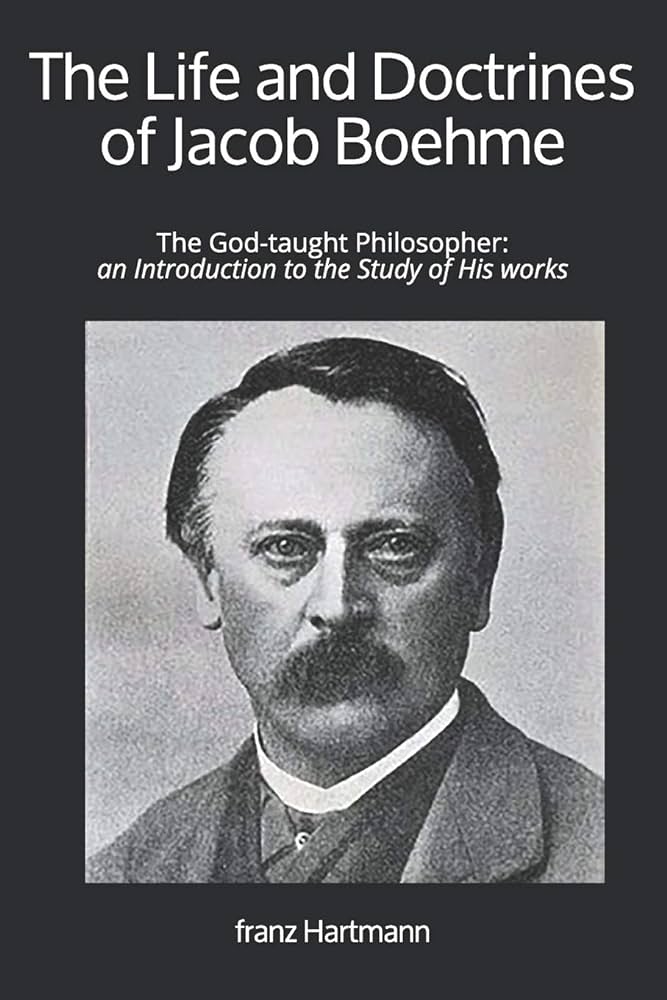Jacob Boehme (1575 – 1624) has been called a philosopher, a Christian mystic, a Lutheran Protestant theologian, a Christian Theosophist, and a spiritualis. Boehme fits no one of these categories entirely, and yet he overlaps all of them. Boehme has gained the cognomen Philosophus Teutonicus, called himself the “Philosophus der Einfältigen,” (the philosopher of the simple folk) and Hegel called him the “first German philosopher,” because he was the first to publish philosophical writings in German.
He was considered an original thinker by many of his contemporaries within the Lutheran tradition, and his first book, commonly known as Aurora, caused a great scandal. In contemporary English, his name may be spelled Jacob Boehme; in seventeenth-century England it was also spelled Behmen, approximating the contemporary English pronunciation of the German Böhme.
Franz Hartmann, M.D., author of “Magic, White and Black,” “Paracelsus”, “Yoga and Christianity” and other books in German and in English, put together an epitome of the principal doctrines of Jacob Boehme in a certain systematic order so as to afford a general view of them and to serve as an introduction to the study of Boehme’s works. This book can be found online.
Any student of this work will get to understand that the core ideas of Boehme. Later true esoteric teachings are absolutely compatible and virtually the same. Theosophy has the same core ideas, like those about dualism and manifestation, the eternal becoming of nature, the seven properties of nature and the three principles.
Just as Theosophy, Jacob Boehme insisted on personal first-hand experiences and practice of the Christ-Life as the ground of true religion and saw this as the fundamental feature of his Christianity. He traveled through immense heights and deeps. He had several spiritual experiences and saw the eternal realities of heaven and hell and the world between and he told as well as he could what he saw, but his practical message was always simple: “Thou us thyself be the way. The spiritual understanding must be born in thee.”
Jakob Boehme uses Christian, Rosicrucian and alchemical symbols to elucidate his meanings. This may make understanding of his work a little difficult, at times. Thus, Hartmann added a small appendix to this book, which has fifteen chapters and after the appendix the reader can find a short biography about Jacob Boehme’s life.
The topics covered in this book include the unity of all things, the three principles including nature, the seven qualities, creation, Christ, incarnation, redemption, and death and the afterlife.
Boehme said: “I acknowledge a universal God being a Unity, and the primordial power of Good in the universe; self-existent, independent of forms, needing no locality for its existence, unmeasurable and not subject to the intellectual comprehension of any being. I acknowledge this power to be a Trinity in One, each of the Three being of equal power, being called the Father, the Son, and the Holy Ghost. I acknowledge that this triune principle fills at one and the same time all things; that it has been, and still continues to be, the cause, foundation, and beginning of all things.”
He continued: “I believe and acknowledge that the eternal power of this principle caused the existence of the universe ; that its power, in a manner comparable to a breath or speech (the Word, the Son or Christ), radiated from its center, and produced the germs out of which grow visible forms and that in this exhaled Breath or Word (the Logos) is contained the inner heaven and the visible world with all things existing within them.”
Moreover, he taught that to be a true Christian it was not sufficient to subscribe to a certain set of beliefs; but that only he in whom the Christ is living is a true follower of Christ in spirit and in truth.
There has been a new interest in Jacob Boehme in the last decade and one can find lots of information online. A short introduction to his way of thinking is “The Way from Darkness to True Illumination“. A link to free pdf of many of his books can be found on the Jacob Boehme website. Another short article is “Six Mystical Points“. Another good and short sample of Boehme’s teaching is the youtube video “The Birth of God“.
